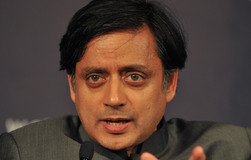
Shashi Tharoor is a renowned politician who served as the United Nations Under Secretary General for Communications and Public Information where he undertook a large number of initiatives, including the United Nations’ first ever seminars on anti-Semitism and Islamaphobia. This groundbreaking legislation helped earn him a nomination for the Secretary General position within the United Nations. Although he wasn’t chosen, Tharoor returned to India where he rose to become a prominent government official. Both Tharoor’s celebrity and high-ranking position make him a desirable subject for many journalists, including one Mehr Tarar.
Mehr Tarar, a journalist for The Lahore, reached out to interview Tharoor last summer. A few months later, Tarar posted cryptic tweets about the new secret love of in her life, as well as tweets publicly admiring Shashi Tharoor. Naturally, Tharoor’s wife began to suspect something unusual was going on. On January 15th 2014, Pushkar went onto her husband’s twitter and revealed, to his 2 million followers, the supposed private messages between Tharoor and Tarar declaring their love to one another. In response, Tharoor declared that his twitter had been hacked. Then, Pushkar confirmed that she wrote the tweets and began claiming that Tarar was stalking her husband and that she was an undercover ISI agent who was trying to infiltrate her marriage to gain political information.
This was a very serious accusation, with the implications involving deception and international government interference. Historically, there is palpable tension between the two south Asian countries. Decolonization and subsequent partitioning of India in the 1940s left bitter feelings of rivalry for many in the region. These feelings lead to conflict from time to time, especially in the hotly disputed Kashmir region, a location Tarar has visited many times for her employer. With Pakistan’s nuclear power status in mind, an accusation like this could only exacerbate tensions. In short, a silly scandal could have very serious impacts on a region where stability is never assured.
Tarar quickly released a statement vehemently denying any affair or association with the ISI and expressed her belief that this claim would place her family in danger. Within 24 hours, Pushkar retracted her statements and released a joint comment with her husband stating that she did not write the tweets. The reality of an election year was likely the motivating factor for the sudden change in Pushkar’s story. It is clear that the back and forth public bickering between an important government official and his wife could only be a negative influence on public opinion.
However, things took a shocking turn the following morning on January 17th when it was announced that Pushkar was found dead in the hotel she and her husband had been sharing. In the wake of this tragedy, a large amount of attention was placed on Tarar and the supposed ISI connections that she had. An equal amount of speculation was placed on Tharoor and many theories from poison to government espionage have begun to surface with regards to Pushkar’s untimely death. The medical examiner ruled out foul play and there is an ongoing investigation into whether Pushkar committed suicide. However, this has not stopped India’s population from wildly speculating about the death of the chief minister’s wife. It is unclear what impact this incredibly public scandal will have on Shashi Tharoor’s chances in the national elections that are quickly approaching. The opposition has wasted no opportunity to criticize Tharoor and hammer him with accusations and condemnation. As is apparent in the United States, public opinion can make or break a national election. Only time will tell what impact this seemingly petty scandal will have on the Indian elections and the region as a whole.








